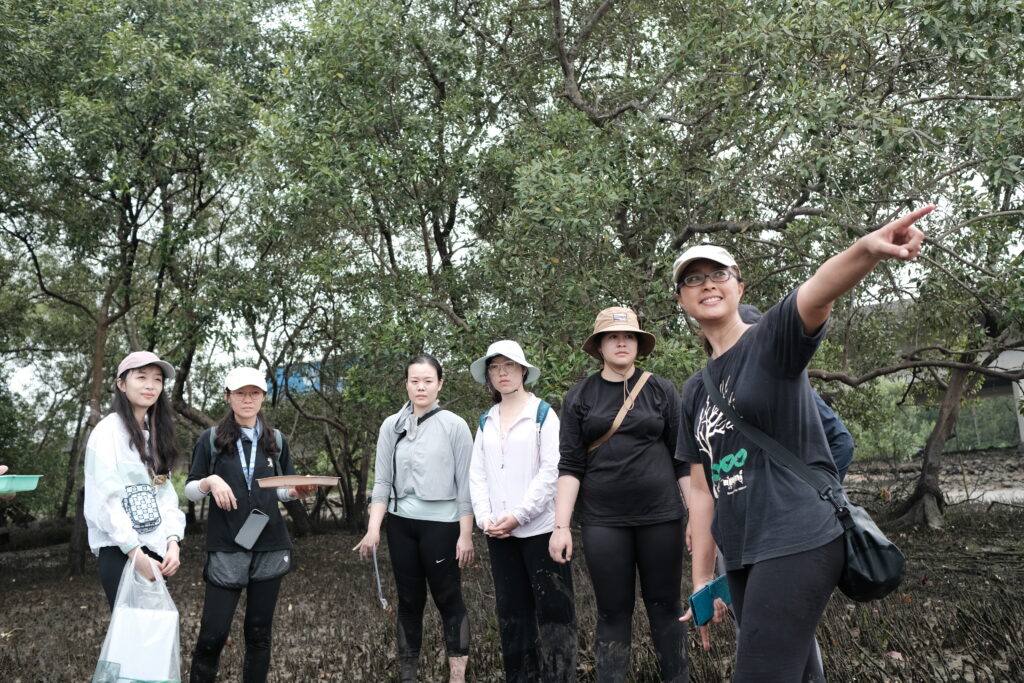Inclusive Sustainability Immersion in Mukim Tanjung Kupang, Johor Malaysia.
February 5, 2024
Inclusive Sustainability Immersion in Mukim Tanjung Kupang, Johor Malaysia.

As part of the unique options offered by the MA in Contemporary Southeast Asia, a matching module to the Gamelan Masterclass is the 2-course credit Field Trip that takes place in the second semester.
This field trip takes postgraduate students to a string of fishing villages in the western Tebrau Strait, between Singapore and Malaysia, where they will meet and engage with the community of Mukim Tanjung Kupang. This is an unparalleled opportunity to get to the ground to learn about changes that this community has had to undergo as a result of development and climate change impacts in their neighbourhood. It is, however, just one example of myriad communities across Southeast Asia facing the same dilemma.
This case study, however, is made accessible to students through this immersion, which is also a unique opportunity to get deep amongst Malaysian rural locals and their lives and livelihoods far from the regular tourist trails.
The fishing community in this sub-district is bound on all sides by escalating development. This comes in the form of urbanisation in the form of luxury residential and business development projects, and industrialisation such as factories and the Port of Tg Pelepas. There is also an impact on their natural habitats as a result of coastal development along the Tebrau Strait, both on the Malaysian and Singapore coasts.
The field trip allows students to see first-hand the impacts of climate change and development on rural communities, as well as maritime transnational landscapes and fluid borders.
Students will get first-hand experience at life in a fishing village and attempt to use some of the equipment (nets/traps) to catch their meals, as well as begin to understand how these communities that supply seafood to the rest of Malaysia (and beyond) suffer from dire economic situations themselves.
As an introduction to the local natural habitats, they will visit a seagrass meadow and mangrove forest, both at risk of being lost to coastal development, and learn of their importance to the community and the environment as a whole. In contrast to these natural areas, they will also be brought to Forest City – a majority-Chinese owned luxury and mixed-use development that landed on this community in 2015.
The visit to the local community will also include cultural aspects such as an introduction to local Chinese history (including information on the Japanese massacre of residents during World War II), and a traditional dance form called zapin that originated in these villages. They will also get to eat locally harvested seafood with the fishermen and other villagers in their home.
While this excursion will push students’ boundaries in the mud, seagrass and natural elements, the outcome will be extremely rewarding. Past students’ testimonials provide proof that it is an opportunity not to be missed.
Past student testimonials:
The field trip is an important method of research. It is useful for master students to experience it and learn from the reality rather than only from the papers and books. (Bing Ying)
The field trip added value to my MA course because I got close to the nature, it let us realize how amazing those habitats are and how seriously they are damaged, and improve our awareness of protecting the environment. (Jieting)
A field trip is always the best way to get more knowledge. Rather than reading a hundred readings, I might as well experience and feel more in an only-three-day field trip. what i smelled, what i felt and what i touched were staying in my memory longer. (Xueying)
This was beyond “usual field trip” that i got to experience in NUS so far. I was able to learn a lot more pragmatically from touching, feeling and smelling than just reading in classes. Also visiting a fishing village is not something I can do in foreign countries especially when I don’t speak their language. And there are many things that I couldn’t have known unless they explained to me. ALSO I appreciate that we could join a Ramadan dinner. It was a whole new experience. So it’s really one of the most memorable experience in NUS. (Mahiro)
The field trip brought some of the things we learned and studied much closer. It allowed us to see some of the theories and concepts we studied in person, which would be impossible to do in Singapore. (Nina)
YES the fieldtrip added value to the MA course. Because if not for this opportunity, through personal travel I would not have gone to the countryside of Malaysia. (Zhi Zhi)
The field trip added value to my MA programme. It helped me understand and appreciate marine and coastal biodiversity even more, and provided me with a unique opportuntiy to witness and therefore understand the range of environmental sustainability challenges the local people and their surrounding flora and fauna need to cope with due to large-scale human activites. (Kata)
Explore the full gallery of fieldtrip moments! Click Here to view more photos. ?

